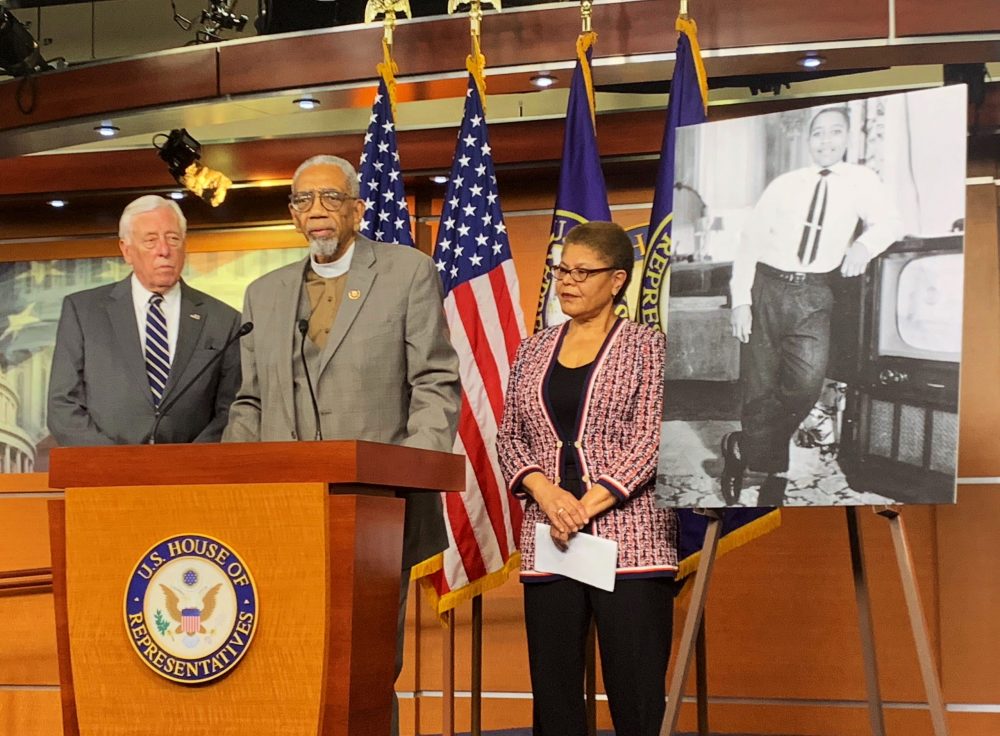(ThyBlackMan.com) “Strange Fruit,” written by Abel Meeropol and recorded by Billie Holiday in 1939, captures the sadness and sadistic nature of lynching in America. Its lyrics compose with horrifying imagery the following scene:
“Southern trees bear a strange fruit, blood on the leaves and blood at the root. Black bodies swinging in the breeze, strange fruit hanging from the poplar trees.”
From 1882 to 1968, an estimated 4,743 lynchings occurred in the United States. Some reports now document that these numbers may be closer to 6,500 people, mostly Black men, Black women and Black children, who were brutally murdered by racial terror lynching. These heinous acts were committed by White Americans who saw it as a way to terrorize, control and oppress Black people after slavery and during the subsequent Jim Crow years.

Local political figures, state authorities, federal law enforcement, and elected officials all ignored, tolerated, and even spurred this racial violence. While the deep stain of lynching will never be fully washed away from our past, the United States Congress has now at least made that blot an indelible mark recognized as a federal hate crime.
The Emmett Till Anti-Lynching Act was signed into law by President Biden to establish the act of lynching as a violation of federal law, and I was honored to attend the White House for this bill’s final steps towards passage.
During the hundred years from Reconstruction to the heights of the civil rights movement in the 1960s, thousands of Americans, most of them Black, were lynched by mobs motivated primarily by racial hatred. Among the victims was Emmett Till, 14, of Chicago, who was kidnapped, beaten, and shot to death while visiting relatives in Mississippi in 1955. This was after false allegations he had leered at a White woman. Till’s mother insisted that his disfigured body be displayed in an open coffin to show our nation the brutality he’d suffered. The ensuing outrage helped to further ignite the civil rights movement.
Our nation has been long overdue for legislation that would outlaw and condemn the barbaric act of lynching. Yet, the pitiful reality is that since 1900 there have been roughly 200 attempts in Congress to pass a federal anti-lynching bill. Shamefully, every single one of these efforts has failed up to this point. We cannot shy away from the disgraceful length of time it took to finally take impactful congressional action and, as lawmakers, create a statute to punish and deter the revolting act of lynching.
The first anti-lynching legislation was introduced by the only Black representative in 1900, Rep. George Henry White (R-NC). His bill never made it out of committee, and over the decades that ensued, there were 200 unsuccessful attempts to carry out his initiative.
Beginning in 1916, the combined mobilization of the NAACP and the Anti-Lynching Crusaders led to rallies and public outcry against the unconscionable practice of lynching that was taking place. In 1922, the House passed an anti-lynching measure, but the Senate used a filibuster that effectively derailed the bill. The effort to kill off the bill was spearheaded by a group of southern senators. Thus began a cycle, as, similar anti-lynching bills were introduced only to be ditched in a fashion that resembled the fortune of endeavors that came before.
In 2005, the Senate made strides by passing a resolution that expressed remorse for failing to pass anti-lynching legislation but still couldn’t gather the votes to transform federal law. The Senate then came close in 2020 to pass an anti-lynching bill that had bipartisan support in the wake of the murder of George Floyd.
Today, we must be grateful that the so-called entertainment of public lynching, where White families enjoyed refreshments as they watched African Americans strung up and murdered, are a thing of the past. But our nation deludes itself if it thinks that such heinous hate crimes don’t still exist. We can look to the modern-day lynching of Ahmaud Arbery in Georgia to understand that this terror has remained. Had the Emmett Till Antilynching Act been on the books already, it might have proved to be a powerful new tool for prosecutors in Mr. Arbery’s case.
While this new law can never fully compensate for the long lives that were stolen from Mr. Till or Mr. Arbery, the enactment of the Act that bears Mr. Till’s name does provide some form of justice as it affirms the fate this young man and so many others have shared was and is despicable. The Emmett Till Antilynching Act will serve as a prosecutorial weapon to put an end to the vile practice of lynching that has contributed to racial violence in the United States for far too long. It is a bill that provides some degree of healing for a nation that still hasn’t fully come to grips with the violent racism of its past and will serve as a way forward to deal with “the strange fruits hanging from its (sick) poplar tree.”
Written by Congressman Kweisi Mfume
Official website; https://mfume.house.gov/

















Thank you Congressman Kweisi Mfume for these explanatory factors, especially the legalities of same.It is my prayer that legal technicians, such as politicians,university professors,lawyers,and scientific inventors will begin to develop viable theories and useful pragmatic scientific tools that may be used in helping to effectively utilize this very necessary Emmett Till Anti-lynching Act to prevent, and or apprehend those who are involved in committing such acts of racial hatred.